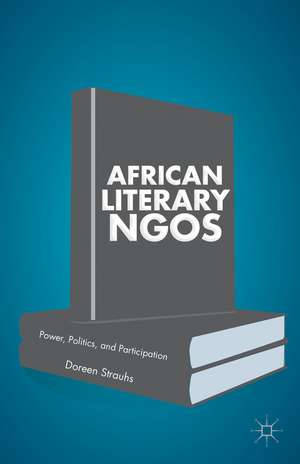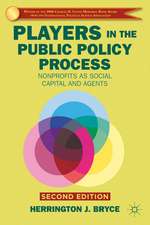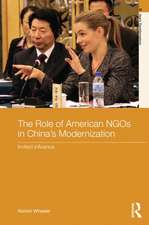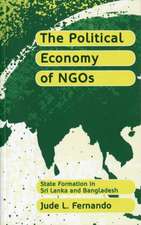African Literary NGOs: Power, Politics, and Participation
Autor Doreen Strauhsen Limba Engleză Hardback – 23 aug 2013
| Toate formatele și edițiile | Preț | Express |
|---|---|---|
| Paperback (1) | 384.31 lei 6-8 săpt. | |
| Palgrave Macmillan US – 23 aug 2013 | 384.31 lei 6-8 săpt. | |
| Hardback (1) | 387.75 lei 6-8 săpt. | |
| Palgrave Macmillan US – 23 aug 2013 | 387.75 lei 6-8 săpt. |
Preț: 387.75 lei
Nou
Puncte Express: 582
Preț estimativ în valută:
74.20€ • 79.34$ • 61.86£
74.20€ • 79.34$ • 61.86£
Carte tipărită la comandă
Livrare economică 17 aprilie-01 mai
Preluare comenzi: 021 569.72.76
Specificații
ISBN-13: 9781137334046
ISBN-10: 1137334045
Pagini: 243
Ilustrații: XII, 243 p.
Dimensiuni: 140 x 216 x 20 mm
Greutate: 0.41 kg
Ediția:2013
Editura: Palgrave Macmillan US
Colecția Palgrave Macmillan
Locul publicării:New York, United States
ISBN-10: 1137334045
Pagini: 243
Ilustrații: XII, 243 p.
Dimensiuni: 140 x 216 x 20 mm
Greutate: 0.41 kg
Ediția:2013
Editura: Palgrave Macmillan US
Colecția Palgrave Macmillan
Locul publicării:New York, United States
Cuprins
Introduction. Kenya and Uganda in the Limelight: Setting the Stage 1. "The landscape had not its like in all the world": (East) African Anglophone Writing from the 1940s to the Late 1990s 2. African Literary NGOs (LINGOs): A Model for African Literary Criticism and Cultural Politics 3. The African Literary Revolution on Our Doorstep?: African LINGOs Past and Present 4. Survival of the Fittest: African LINGOs - An Enduring Phenomenon? 5. "Tongues on Fire": The Politics of Being an African Writer in an African LINGO in the 21st Century 6. "Words that reshape a country" and Literary Canons?: Agency and Narrative 7. Rewriting African Identity, Self, and Place: Civil War and HIV/AIDS in Fiction 8. Some Conclusions and Future Scenarios for the African LINGO in the 21st Century
Recenzii
'This book is a very valuable addition to the scholarship available in the area of African Literature. It frequently highlights the numerous challenges faced by writers working in the postcolonial setting. Strauhs's analysis of the role of LINGOs in the development of literature in the region is focused and highly organized, concentrating on the role of LINGOs in defining the direction of literature and socio-cultural debate in Africa.' - Abasi Kiyimba, Professor, Department of Literature, Makerere University, Uganda
'Doreen Strauhs makes an important and ground-breaking addition to our understanding of African writing in English. While we simply assume that writers write and readers read, this book exposes the complex network of patronage, support, and organization that enables African writing to be written, to be published, and to be read. It is a valuable addition to the library of any scholar of African literature.' - Bill Ashcroft, Australian Professorial Fellow, School of the Arts and Media, The University of New South Wales, Australia
'Based on original research, this book offers an insightful assessment of the thriving literary scene in East Africa and the vital role played by literary organizations in furthering new talents. In her discussion of KWANI Trust (Kenya) and FEMRITE (Uganda), Strauhs provides a valuable interdisciplinary framework for understanding the political and social importance of literary NGOs from the 1960s to the present. Her book makes a timely contribution to the study of writers' networks in Anglophone East Africa.' - Marie Kruger, Associate Professor, University of Iowa, USA
'Strauhs's book is an important contribution to the on-going project of configuring the East African literary archive, past and present. In her meticulous tracing of multiple voices, moments, and creative thrusts across Kenyan and Ugandan literary histories, Strauhs maintains a sensitive finger on the rich pulse of ideas, institutions, and creative impulses at work across the region. This book is much more than a thought-provoking biography of KWANI Trust and FEMRITE: it is a tribute to East African writers' daring imagination.' - Grace A. Musila, English Department, Stellenbosch University, South Africa
'Doreen Strauhs makes an important and ground-breaking addition to our understanding of African writing in English. While we simply assume that writers write and readers read, this book exposes the complex network of patronage, support, and organization that enables African writing to be written, to be published, and to be read. It is a valuable addition to the library of any scholar of African literature.' - Bill Ashcroft, Australian Professorial Fellow, School of the Arts and Media, The University of New South Wales, Australia
'Based on original research, this book offers an insightful assessment of the thriving literary scene in East Africa and the vital role played by literary organizations in furthering new talents. In her discussion of KWANI Trust (Kenya) and FEMRITE (Uganda), Strauhs provides a valuable interdisciplinary framework for understanding the political and social importance of literary NGOs from the 1960s to the present. Her book makes a timely contribution to the study of writers' networks in Anglophone East Africa.' - Marie Kruger, Associate Professor, University of Iowa, USA
'Strauhs's book is an important contribution to the on-going project of configuring the East African literary archive, past and present. In her meticulous tracing of multiple voices, moments, and creative thrusts across Kenyan and Ugandan literary histories, Strauhs maintains a sensitive finger on the rich pulse of ideas, institutions, and creative impulses at work across the region. This book is much more than a thought-provoking biography of KWANI Trust and FEMRITE: it is a tribute to East African writers' daring imagination.' - Grace A. Musila, English Department, Stellenbosch University, South Africa
Notă biografică
Doreen Strauhs is a professional with The German National Academic Foundation, Germany's largest organization sponsoring highly gifted students of outstanding academic achievements. She has been published with Wasafiri, The Journal of Commonwealth Literature, and Kunapipi. From 2006 to 2012, she worked in the East African NGO-sector and conducted research in Kenya, Uganda, and the USA on the contemporary generation of East African writers.












